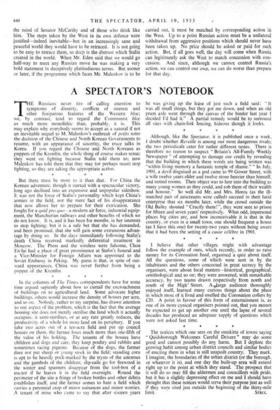But there must be more to it than that. For
China the Korean adventure, though it started with a spectacular victory, long ago declined into an expensive and unpopular sideshow. It was not the force of Stalin's personality which kept China's armies in the field, nor the-mere fact of his disappearance that now allows her to prepare for their extrication. She fought for a quid pro quo—a modern air force, industrial equip- ment, the Manchurian railways and other benefits of which we do not know. It is, and it has been for months, in her interests to stop fighting; but it is a safe bet that she has demanded, and been promised, that she will gain some extraneous advan- tage by doing so. In the days immediately following Stalin's death China received markedly deferential treatment in Moscow. The Press and the wireless were fulsome, Chou En-lai had a place of great prominence at Stalin's funeral and a Vice-Minister for Foreign Affairs was appointed to the Soviet Embassy in Peking. My guess is that, in spite of out- ward appearances, China was never further from being a puppet of the Kremlin.


































 Previous page
Previous page